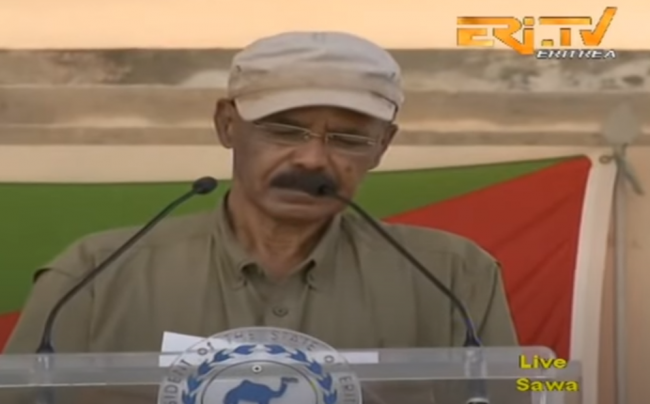Radio Erena: 26 August 2020

The Eritrean journalist Ahmed Alhaj wrote an article from Melbourne, Australia, that went viral in the social media among Arabic language followers. The article was prompted by the pathetic appearance of President Isias Afwerki in the recent graduation ceremony in Sawa. As if stepping out from the ‘Walking Dead’ movie, president Isias looked dreadfully aging, immensely weak, and tellingly desperate. Wearing a casual outfit, reading glasses and baseball cap to hide the dyed remaining hair, his depressed appearance has alarmingly given Ahmed Alhaj a reason to wonder what will happen if this one-man showrunner suddenly disappeared from the Eritrean political scene?
This question is soundly justified with the overriding absence of established governance institutions and the traditions of peaceful and democratic power transition in the country. Bearing in mind that Eritrea after thirty years of independence does not have a vice president who can secure a safe and peaceful power transition.
In the puppet-theatre politics of Eritrea, the president assembles all the cords in his hands: he is the head of the state and government; the supreme chief of the armed forces, and the president of the ruling party. He only spared the National Union of Eritrean Women from his ‘judicious’ presidency.
In such suffocating omnipresence of president Isias Afwerki, the issues of power transition in the case of his sudden disappearance should no doubt be considered as a paramount national concern. A sudden disappearance of the dictator will catch his opponents off guard, as no preparations are seen on the horizon to address the probability of a post-Afwerki period. The eyes would inevitably be directed toward the Eritrean Defense Forces, EDF. But can the EDF play a decisive role in the forthcoming political change in Eritrea? In a broader African setting, many of the continent’s states lack the democratic power transfer modalities, therefore, the armed forces are the exclusively qualified post-colonial organized institutions which are suitably prepared through coup d’états to influence the course of events by toppling an incumbent president or replacing him in the case of a sudden absence from the scene.
Toppling an ‘elected’ government has become extremely difficult as the United Nations and the African Union along with the regional economic-integration organizations such as the Economic Community of West African States have jointly changed the dreams of military juntas into real nightmares.
The most recent coup d’état took place in Mali when the Army forced President Ibrahim Boubacar Keita to resign. Mindful of the challenges facing the budding coup d’état, the spokesperson of the ruling military junta in Bamako colonel Ismael Wagué, in a counter statement to ECOWAS’ stance regarding the Malian crisis, said that the future of his country will only be decided by the Malians themselves with the participation of political parties, socio-political groups, trade unions, and the civil society. This statement reveals the huge pressure on the leading military junta. Nevertheless, the armed forces planning greater political roles in their respective countries will save no means to beat every obstacle. The Sudanese hybrid formula of a joint military-civilian transitional government reached in August last year by an African Union-sponsored agreement seems applicable in other capitals as the Malian junta is taking a similar course to tighten its grip on power with calculated participation of civilians in a three-year transitional period.
However, Eritrea is an odd case, the president in his thirty-year personal rule has used all tricks to weaken and undermine any predictable political role of the EDF; his tactic is the eternally effective ploy of divide and rule, as no three Eritrean generals can maintain good and constructive work relations. Sowing the seeds of discord among the army officers, president Isias has mischievously fortified his undisputed authority.
Fears of the dreadful consequences in the post-Afwerki period forced Ahmed Alhaj to finish his article with an earnest call to all Eritrean opposition factions and parties to unite to draw a roadmap which would chart the anticipated peaceful and democratic political change in the case of the sudden disappearance of Asmara rapidly waning strongman.
By Fathi Osman
